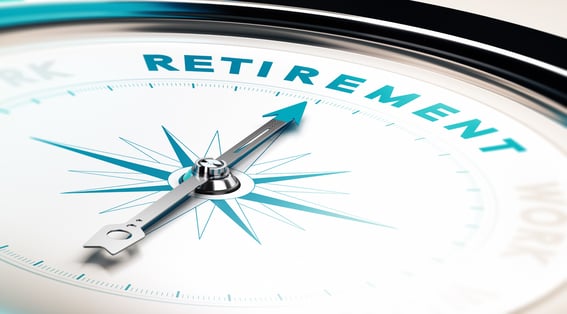How to Navigate your Employer Sponsored Retirement plan
"My employer provides a Retirement Plan (401(k), 403(b), 457, SIMPLE IRA, etc.), but I don't understand it at all!"
This is a comment that we often hear during financial planning meetings. Which is unfortunate because employer provided retirement plans are the largest asset in most households within the United States! As of the end of March 2020 there was $28.7 Trillion in retirement plans within the United States. This dollar amount accounts for 33% of ALL household assets of United States citizens.1
To best maximize this valuable asset it is critical that you have a clear plan for each component of your Retirement Plan. In this post we will answer several questions you may want to consider or implement to get the most out of your employer sponsored plan!
1. How Much Should I Contribute to My Retirement Plan?
Generally speaking, you should contribute AT LEAST enough to receive 100% of your employer’s matching contribution.
For example, you should contribute 5% of your pay if your employer will make your contributions up to 5% of your pay. Recognize though that every financial situation is different. You should take time to review your monthly cash flow and financial goals to determine how much you can reasonably save into your Retirement Plan without affecting your ability to pay your bills.
2. My Plan Offers a Roth Option - Should I Use It?
The Roth component of a retirement plan was first introduced back in 2006 to allow individuals to leverage the benefits of a Roth IRA with more of their retirement dollars. Whether in a Roth IRA or in a Roth 401(k)/403(b)/etc. you contribute funds AFTER paying income taxes. If the Roth has been open for a minimum of 5 years and you are over the age of 59.5 you will be able to remove your contributions AND investment earnings tax free.
Historically investors have contributed funds to the Pre-Tax component of their 401(k) to decrease their current taxation. The thinking in this case is that most individuals expect to have a lower level of taxable income in retirement than what they have while working. Thus, it makes sense to save money in the short term on taxes. We see a couple of issues with this advice:
- We have no clear indication what income taxes will look like in the future – With current monetary policy and our national debt ever growing, there is a strong likelihood that income taxes will increase in the future. If 100% of your assets are saved in the Pre-Tax component of your retirement plan this is potentially putting you in a position to pay taxes at a higher level than what you would today.
- You Lose Some Control and Flexibility – You will be required to start making withdrawals from your Pre-Tax Retirement Plan or Traditional IRA via a Required Minimum Distribution starting currently at age 72. The required amount will increase with every year.
So-back to the question at hand - should you contribute to the Roth option? Generally speaking, many of our clients have begun to contribute at least a portion of their retirement plan contributions to a Roth component when it's offered.
I would encourage you to meet with a trusted advisor to discuss how your current contributions may impact your current and future income tax, not to mention your long-term goals. There are several more finite details may apply to your situation.
3. How Should I Invest My Retirement Plan Contributions?
Throughout the years we have reviewed the investment options in thousands of retirement plan accounts. In most cases retirement plans provide 10-15 mutual funds from which you can select. Most investors utilize something called a Target Date or Target Retirement fund. These funds invest your dollars in a certain risk tolerance that is determined by when you plan to retire. For example, if you are 40 years from retirement close to 100% of your funds may be invested in stocks. As you get closer and closer to retirement age the fund automatically moves money from stocks into bonds. Target Date or Target Retirement funds are a quick and easy way to get your money working for you!
Recently, many retirement plans now offer a Self-Directed Brokerage component to the investors in the plan. This option has increased in popularity as it provides investors access to higher quality investment and diversification options. Within these accounts you as the investor can select the investments that you would like to invest in. Investors have the ability to invest in any stock, bond, mutual fund, or ETF that is publicly traded in the Brokerage component of their retirement plan.I would encourage you to start your retirement plan by investing in the appropriate Target Date Fund. As your account balance increases in size it may be wise to consider diversifying your investment options within the Self-Directed Brokerage component.
If you do use the Self-Directed Brokerage option, I suggest that you meet with your investment advisor to ensure that your investment selections are aligned with your goals and overall risk tolerance.
4. I am getting close to retiring and am concerned about losing money in my retirement plan – Do I have any options to reduce my risk?
Losing money in their investment accounts often becomes a concern as people get closer to retirement age. Investors who are over the age of 59.5 and still working may have the option to take advantage of an In-Service Distribution.
An In-Service Distribution provides employees who are age 59.5 or older the option to rollover their retirement balance to an IRA account while still working.
This option gives individuals approaching retirement the opportunity to better diversify their investments and to begin structuring their retirement income plan while still working and contributing to their retirement plans. If you utilize an In-Service Distribution you will still be able to contribute to your Retirement Plan while working because this DOES NOT close your retirement plan.
If you have a question about the information discussed above or if you have another question regarding your Employer's Retirement Plan, give us a call or to request a call back from one of our advisors use the link below!

Creekmur Wealth Advisors may be reached at 866-358-4441 or Info@Creekmurwealth.com.
Citations.
1 - https://www.ici.org/research/stats/retirement/ret_20_q1



